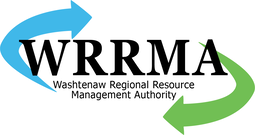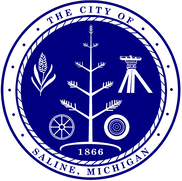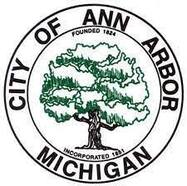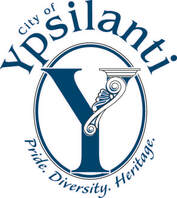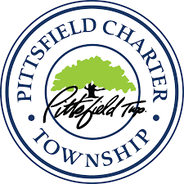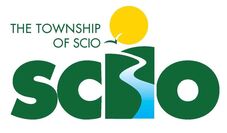What is a Waste Authority?
Solid waste authorities provide the intergovernmental structure for municipalities to collaborate and work together on regional solid waste issues. Authorities address large scale solid waste issues by enabling communities to take advantage of economies of scale, operational efficiencies, and resource sharing. Authorities also provide opportunities for cohesive messaging and standardizing waste services. This allows residents to better understand recycling and waste services by encouraging consistency between work and home scenarios.
About WRRMA
What is WRRMA?
WRRMA is a waste authority formed by eight municipalities in Washtenaw County. Ann Arbor Charter Township, Pittsfield Charter Township, Scio Township, and Ypsilanti Township, in addition to the cities of Ann Arbor, Dexter, Saline, and Ypsilanti are all members of WRRMA. WRRMA officially formed in September 2019.
WRRMA’s short-term goal is to increase the quality of the recycling streams in its member communities. This means we are trying to work with our residents, businesses, and partners to recycle better. Delegates from member communities meet with Washtenaw County staff and legal counsel at monthly intervals. Check our meetings page for more information.
Primary Goal & Purpose
The Washtenaw Regional Resource Management Authority aims to decrease recycling contamination in Washtenaw County communities. Recycling with small amounts of contamination are sold to end markets at higher prices, saving money for the community. WRRMA believes that by joining together as an authority, it can create cohesive recycling messages that can increase the quality of its recycling streams even further.
WRRMA is a waste authority formed by eight municipalities in Washtenaw County. Ann Arbor Charter Township, Pittsfield Charter Township, Scio Township, and Ypsilanti Township, in addition to the cities of Ann Arbor, Dexter, Saline, and Ypsilanti are all members of WRRMA. WRRMA officially formed in September 2019.
WRRMA’s short-term goal is to increase the quality of the recycling streams in its member communities. This means we are trying to work with our residents, businesses, and partners to recycle better. Delegates from member communities meet with Washtenaw County staff and legal counsel at monthly intervals. Check our meetings page for more information.
Primary Goal & Purpose
The Washtenaw Regional Resource Management Authority aims to decrease recycling contamination in Washtenaw County communities. Recycling with small amounts of contamination are sold to end markets at higher prices, saving money for the community. WRRMA believes that by joining together as an authority, it can create cohesive recycling messages that can increase the quality of its recycling streams even further.
Communities
There are eight municipalities that make up the Washtenaw Regional Resource Management Authority.
Timeline
2017
Washtenaw County leads a stakeholder engagement to assess feasibility of a regionalized approach to waste services, with a short-term focus on recycling and a longer-term vision of a regionalized waste system.
May 2018
Regionalization study completed. Primary needs identified include education and outreach, local recycling processing through a materials recovery facility (MRF), and drop off stations (DOS) for handling hard to dispose of materials.
September 2019
WRRMA is officially established.
April 2020
WRRMA is awarded a Recycling Quality Improvement Grant through The Recycling Partnership and the Michigan Department of Environment, Great Lakes and Energy. This grant provides funding for the Feet on the Street Tagging program, as well as education and outreach pre- and post- program to reduce recycling contamination. Municipalities throughout the nation have successfully reduced recycling contamination up to 40% utilizing the same program.
February 2022
The City of Ann Arbor officially joins as a WRRMA member.
Washtenaw County leads a stakeholder engagement to assess feasibility of a regionalized approach to waste services, with a short-term focus on recycling and a longer-term vision of a regionalized waste system.
May 2018
Regionalization study completed. Primary needs identified include education and outreach, local recycling processing through a materials recovery facility (MRF), and drop off stations (DOS) for handling hard to dispose of materials.
September 2019
WRRMA is officially established.
April 2020
WRRMA is awarded a Recycling Quality Improvement Grant through The Recycling Partnership and the Michigan Department of Environment, Great Lakes and Energy. This grant provides funding for the Feet on the Street Tagging program, as well as education and outreach pre- and post- program to reduce recycling contamination. Municipalities throughout the nation have successfully reduced recycling contamination up to 40% utilizing the same program.
February 2022
The City of Ann Arbor officially joins as a WRRMA member.
F.A.Q. (Frequently Asked Questions)
How does WRRMA affect me if I live in one of the member communities?
WRRMA members all contract with waste and recycling services individually. Continue to recycle and dispose of items as your municipality has instructed you to (check out our recycling resources page to make sure you’re up to date).
Why did you form a waste authority?
A regionalization study conducted by Resource Recycling Systems in 2017 found many municipalities in Washtenaw County had similar solid waste needs for their communities. These were improved education and outreach, a materials recovery facility (MRF) for sorting recycling, and drop-off stations (DOS) for hard-to-recycle items. These needs are best tackled from a regional level. Representatives from multiple municipalities met with Washtenaw County staff and a legal counsel many times before WRRMA was incorporated to create a shared vision and discuss goals and objectives. This culminated in a drafted set of Articles of Incorporation for WRRMA, then adopted by seven charter municipalities.
Are there other waste authorities?
Some of the nearby authorities you might be familiar with include Western Washtenaw Recycling Authority (WWRA), South Oakland County Resource Recovery Authority (SOCRRA), and Resource Recovery and Recycling Authority of Southwest Oakland County (RRASOC).
How do I pronounce "WRRMA"?
We've been pronouncing it "warm-ah".
How do I recycle [insert specific item here]?
WRRMA's member communities are all still in the waste services contracts they previously held before WRRMA was formed. We've compiled some recycling resources for you (choose "recycling resources" from the menu above), so check there first! If you still cannot find your item, try using a more generic search term, utilizing the recycling databases found on the resources page, or contacting your waste hauler or recycling provider directly.
Why is recycling different sometimes?
What you can recycle depends on where your recycling goes when its picked up. A recycling hauler collects recycling and brings it to a processing center called a Materials Recovery Facility (MRF). The machinery installed at a MRF is what dictates what can be recycled there. If the MRF doesn't have processing equipment that can handle separating glass, for example, your recycling hauler might not accept glass as a recyclable.
Recycling is also not static. It can change due to markets and other factors that influence the economy. MRFs need to find buyers for the end product of recycled materials. Many of these are processors that will turn the recycled materials into new product. Processors can move, close, open, or shift what they produce just like any other business. When a MRF loses a market for an item, some can store bales of the item while they search for new buyers, while others do not have the space to do so. It's best to stay aware of any changing requirements from your recycling hauler or municipality.
Recycling is also not static. It can change due to markets and other factors that influence the economy. MRFs need to find buyers for the end product of recycled materials. Many of these are processors that will turn the recycled materials into new product. Processors can move, close, open, or shift what they produce just like any other business. When a MRF loses a market for an item, some can store bales of the item while they search for new buyers, while others do not have the space to do so. It's best to stay aware of any changing requirements from your recycling hauler or municipality.
Have a question not answered here? Send us a note at [email protected].
Documents
Summary of Activities
2020
2021
2022
Strategic Plan
2020
Articles of Incorporation
Updated February 18, 2022
2020
2021
2022
Strategic Plan
2020
Articles of Incorporation
Updated February 18, 2022
|
|
